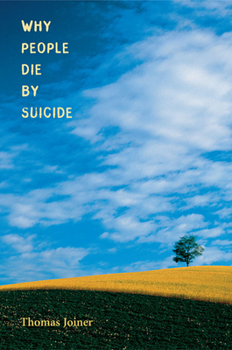Why People Die by Suicide
Select Format
Select Condition 
Book Overview
In the wake of a suicide, the most troubling questions are invariably the most difficult to answer: How could we have known? What could we have done? And always, unremittingly: Why? Written by a clinical psychologist whose own life has been touched by suicide, this book offers the clearest account ever given of why some people choose to die.
Format:Paperback
Language:English
ISBN:0674025490
ISBN13:9780674025493
Release Date:September 2007
Publisher:Harvard University Press
Length:288 Pages
Weight:0.74 lbs.
Dimensions:0.7" x 5.5" x 8.2"
Customer Reviews
4 ratings
A unique blend of professional detachment and personal passion.
Published by Thriftbooks.com User , 16 years ago
An insightful exploration of the phenomenon of death by suicide. It will help both those who have been bereaved by suicide, and those who wish to understand why their loved one might be at risk. Be aware, though, that the book doesn't seek to give you a detailed practical plan for intervention.
Sensitive, scientific and helpful
Published by Thriftbooks.com User , 18 years ago
Thomas Joiner is one of the leading scientific experts on suicide. This is certainly reflected in his excellent review of major theories and evidence---but what strikes me throughout the book is how compassionate, how human and how personal his own story is. He begins the book by noting that his father died by suicide. Throughout his discussions of the research on suicide--which Joiner handles with great skill-- he comes back to remind us that suicide is about someone's parent, brother, sister, child or friend. Suicide has been a topic of research interest since Durkheim advanced his theory of "altruistic" suicide and anomie. Indeed, Joiner's review of the research appears to support this classic theory. Individuals more likely to kill themselves are either feeling like a burden to others (thus, the "altruistic" model) or that they are so detached that they do not "belong". These are certainly issues that we must all keep in mind with an ageing population---of people who may feel that they are a burden. Joiner urges us to recognize that this "perception" is almost always a distortion--- but it may feel real to the suicidal person. Moreover,Joiner clearly shows that suicidal risk is increased as the individual repeats self-injury--- cutting, bruising, dangerous activities, even tatooing. As the individual becomes more accustomed to being in control of his or her pain, suicide becomes the next step on a slippery slope. Of course, other models stress the importance of hopelessness, depression or substance abuse as predictors--and, although Joiner argues these are secondary to belongingness and burden--- those of us (as therapists) working with suicidal people need to attend to all of the precursors. I hope that this excellent, compassionate, very personal but also very scientific book gets a wide readership. It may be difficult to read "about suicide" but it may help you either understand why someone you know may have committed suicide--or, even better, it may help you support someone and help them stay alive. Bravo to Joiner for writing this book.
Suicidology and applied science
Published by Thriftbooks.com User , 18 years ago
I'm a grad student working on adolescent suicide. While updating my theoretical framework I ordered the book as soon as it was made available (mainly because I knew Joiner from authoring many journal articles on the subject and thus anticipated expertise and scope in his work). I was not disappointed. Joiner takes the neofite and the scholar into a different perspective on suicide: understanding and learning from empirical evidence as well as professional (and personal) experience. Clearly, a well-structured effort to destigmatize the issue of identifying warning signs and being able to intervene effectively whether your are a concerned relative or friend, for example. Nowadays, where models on suicidal behavior have long overrun mere interpretation Joiner presents with one that captures features of the suicidal process that can be translated into psychological intervention parameters and even public health policy.
The Best Book on the Subject I Have Seen
Published by Thriftbooks.com User , 18 years ago
This book is just an excellent combination of personal and academic. It is very well written. It has got substance and depth to it. It breaks some new ground. Family and friends of people who have died by suicide, who know the emotional wreckage it leaves behind, who know that suicide is a sum producer of much more pain that it solves, are more not less likely to do it themselves. Why? Partly, "people desire death when two fundamental needs are frustrated to the point of extinction; namely, the need to belong with and connect to others, and the need to feel effective with or to influence others." Well, for survivors, the second part of this has been pretty well challenged. The first part gets challenged too: the topic is still somewhat taboo, despite that everyone knows that talking about it is important, there is real difficulty to it. Connection, on the issue, takes work. The ideas and the feelings expressed in this book come across as real and true and well grounded. I thank Thomas Joiner for writing it.






